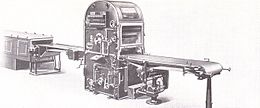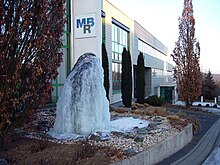Winkler + Dünnebier
| Winkler + Dünnebier GmbH
|
|
|---|---|
| legal form | Company with limited liability |
| founding | 1913 |
| Seat |
Neuwied , Germany |
| management | Frank Eichhorn |
| Number of employees | 500 (W + D group) |
| Branch | mechanical engineering |
| Website | www.wd.de |
| As of August 1, 2018 | |
The Winkler + Dünnebier GmbH is a mechanical and plant engineering company in Neuwied ( Rheinland-Pfalz ). She was from 1998 to 2010 at the Frankfurt Stock Exchange (FWB) listed and from 1999 to 2003 at the SDAX included. In 2010, Körber AG became the sole shareholder and took the company off the stock exchange. On August 15, 2011, the company changed its legal form from AG to GmbH. Since January 1, 2016, Winkler + Dünnebier GmbH has belonged to the American Barry-Wehmiller Group together with W + D POEM in Neuwied and the branches W + D Asia Pacific in Malaysia and W + D North America in the USA .
The company manufactures machines for the production, printing and inserting of envelopes and mailers, as well as production systems for the hygiene industry and is a leading global supplier of special machines. The confectionery machinery business was spun off from the company in 1996 and continued to operate separately.
history
First patents
As early as September 15, 1900, Max Dünnebier (1878–1950), who lived in Heidenau ( Saxony ), received his first patent for a machine for the production of envelopes and bags (Pat. No. 154424). Alfred Winkler (1872–1945), who originally came from Zittau (Saxony) and moved to Neuwied , was granted patent no. 213091 on February 1, 1908 for a folding device on envelope machines.
Establishment and development until the end of the Second World War
In 1913, Alfred Winkler and Max Dünnebier founded the Winkler & Dünnebier company in Neuwied. The first workshops were in downtown Neuwied. In 1917 the first factory hall was built at the current location on Sohler Weg in the Heddesdorf district . The founding of the company was based on the above-mentioned inventions and patents for envelope machines . These developments made it possible to achieve significantly higher speeds and precision in envelope production than conventional folding machine technology. The distribution took place under the brand name Helios . The first order for the innovative machines came from the Neuwied envelope factory Willy Strüder (founded in 1889). The first foreign order came from England. Because of the outbreak of war, these were delivered via the neutral Netherlands.
The outbreak of the First World War brought Winkler & Dünnebier a major collapse in business. Alfred Winkler tried to counter this by entering the confectionery machine business. After receiving a patent for a chocolate enrobing machine in 1914, a first example was delivered to a major German chocolate factory in 1916. After the First World War, these machines were then sold worldwide. Before that, however, Winkler & Dünnebier was involved in the armaments industry and, from 1917, had to manufacture mainly shell casings.
After the end of the war, the machine park worn out by war production and the hyperinflation of Winkler & Dünnebier made it very difficult to restart machine production. When the leading US envelope manufacturer Tension Envelope offered to sell the Winkler & Dünnebier envelope machines in the US in 1922, a new, huge market opened up for the Neuwied company. In order to meet the growing demand for cast parts, Winkler & Dünnebier leased a foundry in Hangelar in 1924 and bought it in 1929.
During the global economic crisis in 1929, the company got into a serious economic situation because of loan cancellations by Dresdner Bank . Only the quick financial help from Tension Envelope ensured Winkler & Dünnebier's survival.
Winkler & Dünnebier recovered so well after the global economic crisis that in 1936 the competitor and former employer could be taken over by Max Dünnebier Fischer & Wescher. A few years earlier, this company had developed a rotary envelope machine that no longer produced envelopes from a stack of punched sheets, but directly from the roll of paper. However, there was not enough space in the Sohler Weg plant for the production of the technically based paper roll envelope machines from Winkler & Dünnebier. Therefore, in 1937, the production rooms of the former Neuwied soap factory of Dreiring-Werke KG were acquired in the nearby Blücherstraße and the confectionery machines area was outsourced to the new location called Plant II.
From 1939 to 1945 the company was again obliged to produce equipment essential for the war effort and manufactured gauges , measuring tools and test devices for the armaments industry in Plant II .
Development since the end of the Second World War
After 1945, under the direction of the new senior boss, Richard Winkler , the reconstruction of the factories in Neuwied and Hangelar, which had been badly damaged by the Allied bombing and dismantling, and the resumption of production. Before machine production could start up again in mid-1946, the company made do with the delivery of spare parts and the repair of envelope and confectionery machines damaged by the war. Can sealing machines were even built.
In 1967 Winkler & Dünnbier started up the first foreign production facility in Anoeta (near Tolosa , Spain ). With the purchase of the Bruno Pahlitzsch company ( Berlin ) in 1970, the last major competitor in the field of envelope engineering was taken over. After Richard Winkler's death in early 1972, his nephew Dr.-Ing. Alfred Doderer-Winkler (1929–2019) successor as managing director and personally liable partner.
In 1973 a sales and production facility was set up in Overland Park , Kansas / USA. With the takeover of JH Spoerl Maschinenfabrik in Düsseldorf in 1976, the establishment of the hygiene department began as a new business area. Machines were built for the production of various hygiene items such as paper handkerchiefs , napkins , panty liners , diapers and sanitary towels .
The British financial investor Doughty Hanson & Co acquired the company in 1996 as part of the succession plan for the family shareholders. The company management received a small contribution. The "Confectionery" division was spun off and acquired by the Runkel family. Since then, it has continued this area as Winkler und Dünnebier Süßwarenmaschinen GmbH in Rengsdorf (Rhineland-Palatinate, Germany).
In 1998 the company was converted into a stock corporation and the company name (company) changed to Winkler + Dünnebier AG. The company went public for DM 88 (€ 44.99) per share. In the course of the IPO, Doughty Hanson & Co parted with its majority stake. Takeover of the packaging machine manufacturer MEC Maschinenbau GmbH in Alsdorf (North Rhine-Westphalia / Germany).
In 2000, Winkler + Dünnebier contributed 0.4 million euros to the compensation fund for Nazi forced laborers . In 2004, Körber AG (owned by the Körber Foundation ) in Hamburg took over the majority of the shares for € 9.75 per share. In 2008 Langhammer Maschinenbau GmbH in Eisenberg (Palatinate) , which manufactures machines for transport and palletizing technology, was taken over. The company name was changed to W + D-Langhammer GmbH. Langhammer GmbH has been part of Körber Process Solutions as an independent company since 2011.
In the course of a squeeze-out procedure, the share capital of Winkler + Dünnebier was taken over in full by Körber AG at the end of April 2010 and the minority shareholders were compensated in cash with an amount of € 16.23. At the end of the year, Winkler + Dünnebier AG acquired the business operations of Buhrs ITM GmbH ( Löhne ), which then operates as W + D Direct Marketing Solutions. The company specializes in mailing and fulfillment solutions in the inserting sector.
In 2011 the company changed its legal form from an AG to a GmbH . In 2012, W + D Direct Marketing Solutions GmbH was merged into Winkler + Dünnebier GmbH. The location in Löhne remained. In October 2015, Körber AG announced the sale of Winkler + Dünnebier GmbH and its subsidiaries to the US company Barry-Wehmiller , of which it has been a member since the beginning of 2016. On January 1, 2017, W + D North America took over operational responsibility for the former competitor FL Smithe Company based in Duncansville / USA. On March 31, 2017, Winkler + Dünnebier acquired the offset and digital printing system manufacturer Halm Industries from New York and another branch in Sassenheim, Netherlands. Winkler + Dünnebier will acquire BICMA Hygiene Technologie GmbH in Mayen on February 1, 2018.
Winkler + Dünnebier currently
Today two independent companies have "Winkler and Dünnebier" in their names. These are:
Winkler + Dünnebier GmbH
According to its own information, the company is the world's leading manufacturer of envelope and hygiene products machines. In addition to the headquarters in Neuwied , Germany also has an operating facility in Bad Oeynhausen, where inserting machines and modules are mainly developed, as well as an independent subsidiary for hygiene technology in Mayen. Abroad, there are locations in the USA and Malaysia. Frank Eichhorn is the managing director. Since January 1, 2016, W + D has been part of the Barry-Wehmiller Group as an independent company .
subsidiary company
- PreOwnedEnvelopeMachines GmbH (POEM), Neuwied, Germany
- W + D North America Inc., Lenexa, Kansas , and Duncansville, Pennsylvania, USA
- W + D Asia Pacific Sdn. Bhd., Petaling Jaya, Malaysia
- BICMA Hygiene Technologie GmbH, Mayen, Germany
Winkler and Dünnebier Süßwarenmaschinen GmbH
This company is part of the Maschinenbau Runkel (MBR) company and, according to its own information, is a leading global manufacturer of plant technology for the manufacture of confectionery products. The product range includes a. Manufacturing plants for chocolate, candy, jelly, foam and rubber products. The company headquarters and production site is in Rengsdorf (Rhineland-Palatinate). The company had 157 employees as of 2013 and generated a gross profit of 20 million euros . Rainer Runkel is currently the managing partner .
literature
- 25 years of Helios machines. Edited by Winkler & Dünnebier machine factory and iron foundry, Strüdersche Buchdruckerei, Neuwied 1938.
- 50 years of Winkler + Dünnebier, 1913–1963. Edited by Winkler & Dünnebier machine factory and iron foundry, Hoppenstedts Wirtschafts-Archiv publishing house, Darmstadt 1963.
- "50 years of Winkler & Dünnebier", in "Home calendar of the Neuwied district - 1964", p. 133.
- "Welcome to Winkler & Dünnebier", ed. Winkler & Dünnebier, Druck Strüder KG, Neuwied 1966.
- Festschrift Richard Winkler for his 70th birthday. Edited by Winkler & Dünnebier machine factory and iron foundry, Neuwied 1968.
- 75 years of Winkler + Dünnebier, 1913–1988. Edited by Winkler & Dünnebier Maschinenfabrik und Eisengiesserei, Neuwied 1988.
- Klara van Eyll , Renate Schwärzel: German Economic Archives. Volume 1, Franz Steiner Verlag, 1994, ISBN 3-515-06211-4 , p. 304.
- Hermann-Joseph Löhr: "Production started 100 years ago in the backyard: Alfred Winkler and Max Dünnebier founded an envelope factory in 1913", in "Neuwied district: Heimatjahrbuch - 2013", pp. 310-314.
Individual evidence
- ^ Realignment of the management of W + D , January 1, 2016
- ↑ Formerly the soap factory "Welcker & Buhler", which was taken over by the "Dreiring-Werk KG" in 1920 together with the new competitor "PH Schrauth".
- ↑ Federal Gazette : Annual financial statements for the financial year from 01/01/2013 to 12/31/2013




